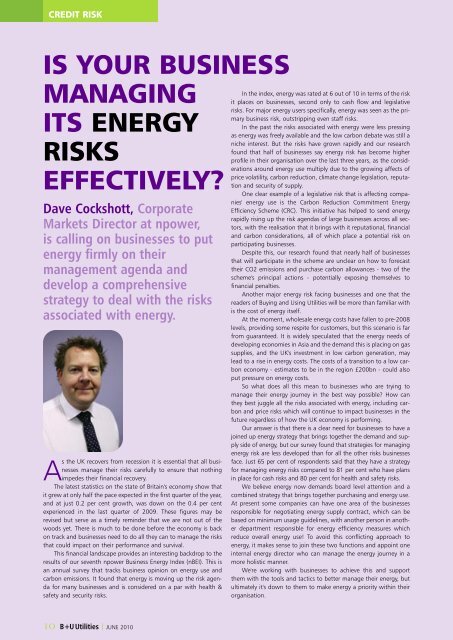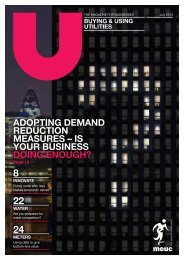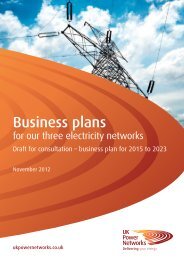CRC - MEUC
CRC - MEUC
CRC - MEUC
You also want an ePaper? Increase the reach of your titles
YUMPU automatically turns print PDFs into web optimized ePapers that Google loves.
CREDIT RISK<br />
IS YOUR BUSINESS<br />
MANAGING<br />
ITS ENERGY<br />
RISKS<br />
EFFECTIVELY?<br />
Dave Cockshott, Corporate<br />
Markets Director at npower,<br />
is calling on businesses to put<br />
energy firmly on their<br />
management agenda and<br />
develop a comprehensive<br />
strategy to deal with the risks<br />
associated with energy.<br />
As the UK recovers from recession it is essential that all businesses<br />
manage their risks carefully to ensure that nothing<br />
impedes their financial recovery.<br />
The latest statistics on the state of Britain's economy show that<br />
it grew at only half the pace expected in the first quarter of the year,<br />
and at just 0.2 per cent growth, was down on the 0.4 per cent<br />
experienced in the last quarter of 2009. These figures may be<br />
revised but serve as a timely reminder that we are not out of the<br />
woods yet. There is much to be done before the economy is back<br />
on track and businesses need to do all they can to manage the risks<br />
that could impact on their performance and survival.<br />
This financial landscape provides an interesting backdrop to the<br />
results of our seventh npower Business Energy Index (nBEI). This is<br />
an annual survey that tracks business opinion on energy use and<br />
carbon emissions. It found that energy is moving up the risk agenda<br />
for many businesses and is considered on a par with health &<br />
safety and security risks.<br />
10 B+U Utilities | JUNE 2010<br />
In the index, energy was rated at 6 out of 10 in terms of the risk<br />
it places on businesses, second only to cash flow and legislative<br />
risks. For major energy users specifically, energy was seen as the primary<br />
business risk, outstripping even staff risks.<br />
In the past the risks associated with energy were less pressing<br />
as energy was freely available and the low carbon debate was still a<br />
niche interest. But the risks have grown rapidly and our research<br />
found that half of businesses say energy risk has become higher<br />
profile in their organisation over the last three years, as the considerations<br />
around energy use multiply due to the growing affects of<br />
price volatility, carbon reduction, climate change legislation, reputation<br />
and security of supply.<br />
One clear example of a legislative risk that is affecting companies'<br />
energy use is the Carbon Reduction Commitment Energy<br />
Efficiency Scheme (<strong>CRC</strong>). This initiative has helped to send energy<br />
rapidly rising up the risk agendas of large businesses across all sectors,<br />
with the realisation that it brings with it reputational, financial<br />
and carbon considerations, all of which place a potential risk on<br />
participating businesses.<br />
Despite this, our research found that nearly half of businesses<br />
that will participate in the scheme are unclear on how to forecast<br />
their CO2 emissions and purchase carbon allowances - two of the<br />
scheme's principal actions - potentially exposing themselves to<br />
financial penalties.<br />
Another major energy risk facing businesses and one that the<br />
readers of Buying and Using Utilities will be more than familiar with<br />
is the cost of energy itself.<br />
At the moment, wholesale energy costs have fallen to pre-2008<br />
levels, providing some respite for customers, but this scenario is far<br />
from guaranteed. It is widely speculated that the energy needs of<br />
developing economies in Asia and the demand this is placing on gas<br />
supplies, and the UK's investment in low carbon generation, may<br />
lead to a rise in energy costs. The costs of a transition to a low carbon<br />
economy - estimates to be in the region £200bn - could also<br />
put pressure on energy costs.<br />
So what does all this mean to businesses who are trying to<br />
manage their energy journey in the best way possible? How can<br />
they best juggle all the risks associated with energy, including carbon<br />
and price risks which will continue to impact businesses in the<br />
future regardless of how the UK economy is performing.<br />
Our answer is that there is a clear need for businesses to have a<br />
joined up energy strategy that brings together the demand and supply<br />
side of energy, but our survey found that strategies for managing<br />
energy risk are less developed than for all the other risks businesses<br />
face. Just 65 per cent of respondents said that they have a strategy<br />
for managing energy risks compared to 81 per cent who have plans<br />
in place for cash risks and 80 per cent for health and safety risks.<br />
We believe energy now demands board level attention and a<br />
combined strategy that brings together purchasing and energy use.<br />
At present some companies can have one area of the businesses<br />
responsible for negotiating energy supply contract, which can be<br />
based on minimum usage guidelines, with another person in another<br />
department responsible for energy efficiency measures which<br />
reduce overall energy use! To avoid this conflicting approach to<br />
energy, it makes sense to join these two functions and appoint one<br />
internal energy director who can manage the energy journey in a<br />
more holistic manner.<br />
We're working with businesses to achieve this and support<br />
them with the tools and tactics to better manage their energy, but<br />
ultimately it's down to them to make energy a priority within their<br />
organisation.







